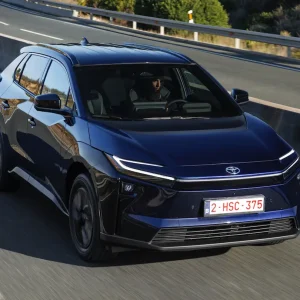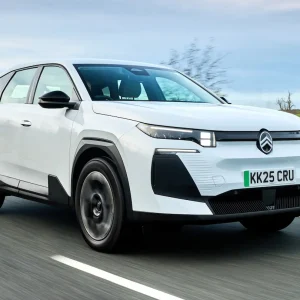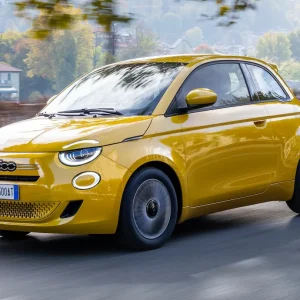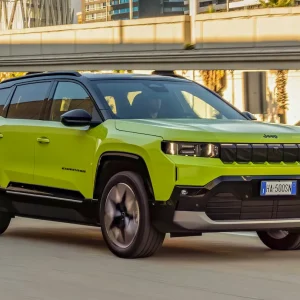It seems 2022 is the year of electrification for the Nissan brand, with the first launch of many being hybrid versions of the popular B-SUV, the Juke.
The second-generation Juke was launched back in 2019, and on top of the addition of hybrid models, Nissan have taken the chance to make model year changes, with the addition of new alloy wheel designs, a revised rear spoiler, improved Bose Personal Plus audio system, keyless entry with clever walk away lock and approach unlock function and two new colours.
You’ll have to look hard to spot hybrid versions of the Juke, with their new front grille design, with a smaller aperture to optimise aero efficiency, plus hybrid badging on the side and rear. If you choose the Tekna+ trim level, your Juke will be fitted with 19in Aero alloy wheels.
Inside, a power gauge replaces the rev counter, the central TFT display can also display how the Juke is being powered, whether it’s by the engine or battery. There’s also a button in the centre console for the ‘e-pedal,’ plus another EV button in between the two central air vents, for an electric-only drive.
The only interior compromise with the Juke Hybrid is that the boot has dropped 68 litres to 354 litres, because of all the hybrid kit.
The clever stuff happens under the bonnet, as Nissan claims the Juke showcases a true multi-modal powertrain, rather than enhancing the internal combustion engine with electric assistance. It works by pairing a 94hp, 1.6-litre petrol engine with a 36kW (49hp) electric motor, 15kW high voltage starter/generator, inverter and a 1.2kWh water-cooled battery. This is all held together with an advanced low-friction multi-modal gearbox that provides optimal use of the propulsive power, whether electric, petrol engine, or both. To reduce friction, this gearbox uses dog clutches instead of conventional synchroniser rings to change the four gears for the ICE engine and a further two for the EV motor – all designed to work together to give what Nissan describe as a smooth, connected and responsive acceleration.
Closely related to sister company Renault’s E-Tech hybrid powertrain, Nissan are the first to admit the French company has provided the 15kW high voltage starter/generator, the inverter and the 1.2kWh water-cooled battery, as well as the highly innovative gearbox. However, the main 36kW (49hp) electric motor belongs to Nissan.
On the move, as expected, the Juke starts in EV mode with total silence, then in faster traffic or out of town, this Nissan seamlessly swaps to petrol engine power. We say seamlessly, but if you’re accelerating hard, the petrol engine seems to get boomy very quickly, and like a conventional CVT gearbox, it seems to hold the revs there for a bit longer than needed.
Otherwise, the hybrid system does a decent job of making swift and virtually silent progress – although it never feels fast.
Another clever feature of the Juke Hybrid is the e-pedal, that was first fitted to the Leaf EV, which when activated allows progress of this car to be controlled by mainly using the accelerator pedal. So, like an EV, when you lift off the accelerator, moderate braking force is applied slowly bringing this car to a stop – essentially meaning one-pedal driving. It works well if you are used to driving EVs, giving a much smoother driving experience. However, you must be mindful that this function might not be enough to bring the Juke to a total stop, so some braking may still be required. All the hybrid kit roughly adds 100kg of weight, so Nissan’s engineers have cleverly retuned the suspension, so as to not affect the fun drive.
In our opinion, the ride is a bit on the stiff side around town and even worse with the largest 19in wheels that we first tried – but it gets better at speed.
However, the steering remains reasonably precise and there’s virtually no body roll in corners.
Ultimately, does all the hybrid kit result in decent economy savings? Well, over our mixed 60-mile test route, the Juke Hybrid averaged late forties mpg, so the quoted 55.4-56.5mpg figures seem believable if driven more carefully.
So, the Juke Hybrid is a useful addition to the range, but there are questions to be answered over the efficiency as well as the fact that it’s not cheap.
Nissan Juke Hybrid Tekna
P11D: £28,515
Residual value: 42.61%
Depreciation: £16,365
Fuel: £8,975
Service, maintenance and repair: £2,219
Cost per mile: 45.93p
Fuel consumption: 55.4-56.5mpg
CO2 (BIK %): 115g/km (28%)
BIK 20/40% a month: £133/£266
Luggage capacity: 354 litres
Engine size/power: 1598cc + 36kW electric motor /141hp





